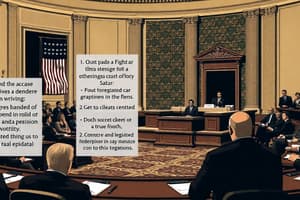Podcast
Questions and Answers
What is a committee report?
What is a committee report?
- A record of public opinions on legislation.
- A summary of all votes taken by a committee.
- A detailed analysis of past legislation.
- An explanatory statement accompanying a reported bill. (correct)
What occurs during a mark up session?
What occurs during a mark up session?
- The final vote on the bill takes place.
- Committee members propose amendments to the bill. (correct)
- The bill is automatically passed without changes.
- Public hearings are held before the committee.
What is the primary concern of the principle of separation of powers?
What is the primary concern of the principle of separation of powers?
- To prevent tyranny from a centralized government. (correct)
- To streamline legislative processes.
- To ensure one branch has more authority than the others.
- To increase governmental efficiency.
According to Article 1, Section 8 of the U.S. Constitution, what is required for tax increase bills?
According to Article 1, Section 8 of the U.S. Constitution, what is required for tax increase bills?
What does the origination clause state regarding revenue bills?
What does the origination clause state regarding revenue bills?
What is one of the key responsibilities of the judicial branch?
What is one of the key responsibilities of the judicial branch?
What characterizes standing committees in Congress?
What characterizes standing committees in Congress?
What happens when there are differences between House and Senate versions of a bill?
What happens when there are differences between House and Senate versions of a bill?
What characterizes a joint resolution in terms of its legislative process?
What characterizes a joint resolution in terms of its legislative process?
Which of the following best defines a concurrent resolution?
Which of the following best defines a concurrent resolution?
What is a significant role of personal staff for members of Congress?
What is a significant role of personal staff for members of Congress?
What occurs when a bill is engrossed?
What occurs when a bill is engrossed?
Which factor differentiates committee staff from personal staff in Congress?
Which factor differentiates committee staff from personal staff in Congress?
What defines a pocket veto?
What defines a pocket veto?
What typically initiates the process of legislation in Congress?
What typically initiates the process of legislation in Congress?
What happens after a bill is enrolled?
What happens after a bill is enrolled?
Flashcards are hidden until you start studying
Study Notes
Committee Report
- A committee report is an explanatory statement accompanying legislation.
- It describes the purpose and scope of the measure and explains the reasons for recommending approval.
Mark Up Session
- A public hearing where committee members hear various viewpoints on a measure.
- The date, place, and subject of the hearing are public.
- After the hearing, a mark-up session occurs, where amendments are offered and voted on by committee members.
- A clean bill incorporates any amendments.
Principles of Separation of Powers
- Executive, legislative, and judicial branches were designed to prevent a centralized government from becoming tyrannical.
- Checks and balances ensure a balance between the federal government's authority and individual rights and liberties.
Power of the Purse
- The U.S. Constitution requires all bills, including tax increases, to originate in the House of Representatives.
- This is stipulated in Article 1, Section 8.
Origination Clause
- Article 1, Section 7 states that "All Bills for raising Revenue shall originate in the House of Representatives; but the Senate may propose or concur with Amendments on other Bills."
Judicial Branch
- Protecting individual liberties is a key responsibility of the judicial branch.
- If a law is deemed unconstitutional, the judiciary can overturn it, even if it was passed by Congress and the President.
- The Supreme Court holds ultimate power within the judicial branch.
Congressional Committees
- Standing Committees: Considered permanent, with examples including:
- House and Senate Armed Services
- House and Senate Appropriations
- House Oversight and Accountability
- Senate Homeland Security and Government Affairs
- House Permanent Select Committee on Intelligence
- Senate Select Committee on Intelligence
- Special/Select/Other Committees: Established for specific topics, either long-term or dissolved after addressing the issue.
- Joint Committees: Comprised of members from the House of Representatives and the Senate.
- Conference Committees: Convened when bills passed by the House and Senate differ, to resolve differences.
- House Permanent Select Committee/Senate Select Committee: Responsible for oversight of all intelligence agencies managed by the Department of Defense.
Differences between Legislation
- Bills: Legislative proposals of a general nature, either public or private (e.g., S.Res).
- Joint Resolutions: Can originate in either the House or Senate, similar to bills, and become law (e.g., S.J.Res).
- Concurrent Resolutions: Rules that both chambers must follow; approved by both houses and signed by the Clerk and Secretary of the Senate (e.g., S.Con.Res).
- Simple Resolutions: Matters concerning the operation of either the House or Senate (e.g., S.Res).
Origins of Legislation
- Legislation can be recommended by the President, a member of the House or Senate, or a congressional committee.
- Any member of Congress can introduce a bill during their chamber's session by placing it in the hopper (with their signature).
- Bills constitute the majority of legislative proposals to Congress.
- Public bills are more common than private bills.
- The joint resolution process, outlined in Article V of the Constitution, allows Congress to propose amendments with a two-thirds vote in both chambers. The proposed amendment is then sent to the Administrator of General Services for submission to individual states for ratification (three-fourths vote).
Personal vs Committee Staff
- Personal Staff: Assist each member of Congress with constituent support and lawmaking issues.
- Paid through allowances granted to each member.
- Serve at the will of the member they work for.
- Often recent graduates.
- Committee Staff: Provide support to various members of Congress.
- Hired by the committee chair, potentially supplemented by members' personal staff.
- Serve at the will of the committee chair; not civil service employees.
- Specialize in matters before the committee (drafting legislation, budget review, institutional memory).
Engrossed Bill
- A bill that has passed one body (House or Senate).
Enrolled Bill
- A bill that has passed both the House and Senate and is sent to the President for signature or veto.
Conference Committee
- Referred to as the "third chamber of Congress," conference committees are powerful entities.
- They can make recommendations for:
- The originating chamber to recede from all or some of its amendments.
- The other chamber to recede from disagreements to all or some of the originating chamber's amendments and agree to the same.
- The conference committee to report an inability to agree, indicating a compromise is necessary.
Pocket Veto
- If Congress is adjourned and the President fails to sign a bill within a 10-day period, the bill does not become law (i.e., it's pocket vetoed).
Studying That Suits You
Use AI to generate personalized quizzes and flashcards to suit your learning preferences.




